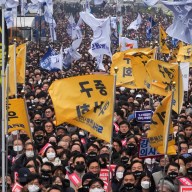 People walk by the World Trade Center site before ceremonies marking the 11th anniversary of the Sept. 11, 2001, attacks on the World Trade Center at Ground Zero in New York.
People walk by the World Trade Center site before ceremonies marking the 11th anniversary of the Sept. 11, 2001, attacks on the World Trade Center at Ground Zero in New York.
Credit: Reuters
First responders at the Sept. 11, 2001, terror attacks face cancer rates 15 percent higher than the rest of the population, a new study found.
The Mount Sinai Hospital’s World Trade Center Health Program reported the findings Tuesday in the Environmental Health Perspectives journal.
Researchers noticed cancers in places like the thyroid, prostate and blood. Rates were highest in responders who were “trapped in the dust cloud” or worked most days at the site, according to the study.
Many 9/11 responders have developed cancers that doctors suspect are related to extended hours breathing in toxins while cleaning up Ground Zero. According to the Patrolmen’s Benevolent Association, about 65 officers have died of cancer since 9/11, and about 300 have been diagnosed.
The study included data from nearly 21,000 participants, finding a total of 575 cancers in 552 people.
These people, the report stated, “sustained exposures to a complex mix of toxic chemicals.”
About 43 percent of the participants were exposed to the dust cloud on Sept. 11, according to the report, and the median number of days they worked on what many called “the pile” was 57 days.
Study co-author Dr. Philip Landrigan saidfor the first time, the study considers a link between several types of cancers in recovery workers and their levels of exposure to dust at the debris pile.
“Our findings strongly highlight the need for continued follow-up and medical surveillance of WTC responders,” said Dr. Samara Solan, who also authored the study.
Researchers also found responders battling persistent health problems like asthma, depression, anxiety and post-traumatic stress disorder.
This new data is even higher than the program’s earlier data, which showed responders’cancer rate at 14 percent higher than expected. The study also echoes one by the FDNY, which said firefighters who had worked at Ground Zero were more likely to develop cancer.
The City Council has requested more information about the link between cancers and responders, and last fall federal officials announced that they would cover about 50 cancers for rescue workers and others who were affected.
Many responders are still waiting for financial help for their illnesses, two years after the Zadroga Act secured funding for their recovery.
















